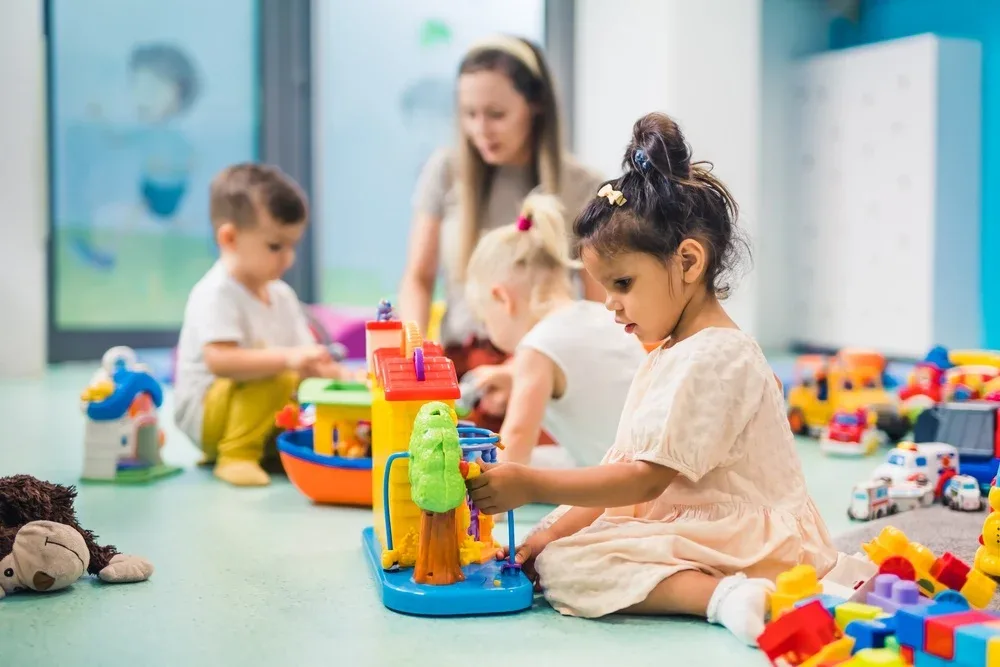
The decision of when to start daycare is a crucial one for parents, as it directly influences their child’s development and daily routines. Whether it’s to accommodate work schedules or to ensure their child’s social, cognitive, and emotional growth, the timing of this transition is a significant consideration.
In this article, we will explore this topic, exploring the ideal age to start daycare and the various factors that should be taken into account.
Contents
- 1 Benefits of Starting Daycare Early
- 2 Factors to Consider
- 3 Risks of Starting Daycare Early
- 4 Ideal Age to Start Daycare
- 5 How to Prepare Your Child for Daycare
- 6 Why Daycare Benefits Toddlers
- 7 Positive Impacts of Daycare on Child Development
- 8 How Daycare Centers Foster Infant Development
- 9 Starting Daycare at 2 Years Old
- 10 Daycare vs. Stay-At-Home Child Development
- 11 Starting Daycare at 1-Year-Old
- 12 Starting Daycare at 18 Months
- 13 Sending Baby to Daycare at 3 Months
- 14 How Long Will They Be at Daycare?
- 15 Assessing Your Child’s Innate Stress Level
- 16 Tips for Smooth Daycare Transition
- 17 FAQs
- 18 Conclusion
Benefits of Starting Daycare Early
Starting daycare early can offer numerous benefits for both children and their families. By immersing children in a social and educational environment from a young age, daycare fosters crucial developmental milestones while providing parents with the support they need to balance work and childcare responsibilities. In this section, we will explore the significant advantages of enrolling children in daycare early, including social, cognitive, and emotional development.
Social Development
Early exposure to daycare environments can be a game-changer for your child’s social skills. Interacting with peers and caregivers in a structured setting can teach them valuable social cues and cooperation, setting the stage for successful future interactions.
Cognitive Development
Daycare settings often offer structured activities and educational opportunities tailored to a child’s age. Engaging in such activities from a young age can stimulate cognitive development, enhancing problem-solving and overall cognitive abilities.
Emotional Development
Being away from parents for short periods in a daycare setting can teach children independence and emotional resilience. Managing separation in a supportive environment prepares them for future transitions. It builds confidence in their abilities to navigate new situations. Learn more:
10 Significant Benefits of Daycare for Infants
Factors to Consider
Considering the decision of when to start daycare for your child involves careful consideration of various factors. From your child’s individual readiness to your family’s unique circumstances, navigating this choice requires thoughtful deliberation. In this section, we will explore the key factors that should influence your decision-making process, ensuring that you make an informed choice that aligns with both your child’s needs and your family’s lifestyle.
Child’s Readiness
Every child is unique, and their readiness for daycare varies. Some children may thrive in a social setting from an early age, while others may need more time to adjust. Observing your child’s behavior, such as their interactions with other children, ability to share toys, and willingness to engage in group activities, can provide valuable insights into their social readiness for daycare.
Additionally, noting their comfort level, such as how they react to being away from familiar caregivers, whether they seek comfort from new adults, and how they respond to new environments, can help gauge their emotional readiness for daycare.
Parental Work Schedule
Starting a daycare is closely tied to parental work schedules for many families. Balancing work commitments with childcare needs is crucial, and starting daycare at an age that aligns with parents’ return to work can ease this transition.
Quality of Daycare

The quality of daycare facilities and programs plays a significant role in determining the ideal age to start. Opting for a reputable daycare that prioritizes safety, learning, and nurturing environments can positively impact a child’s experience, regardless of age.
Risks of Starting Daycare Early
Introducing a child to daycare early can be a pivotal decision for parents, offering numerous benefits for their development. However, it’s crucial also to consider the potential risks of starting daycare early. Understanding these risks allows parents to make informed decisions and take proactive measures to mitigate any challenges that may arise.
In this section, we’ll explore some of the risks of starting daycare early, shedding light on factors such as exposure to illnesses and the potential for separation anxiety. By being aware of these risks, parents can navigate the transition to daycare with greater confidence and preparedness.
Exposure to Illnesses
One concern parents may have about starting daycare early is the increased exposure to illnesses. Daycare environments can facilitate the spread of common childhood illnesses like colds and stomach bugs. While this exposure can strengthen a child’s immune system over time, it may cause temporary disruptions in health.
Separation Anxiety
Young children may experience separation anxiety when starting daycare, especially if they are not accustomed to being away from their primary caregivers. It’s important to remember that this emotional response is normal, and part of the adjustment process.
While it can be challenging for children and parents to navigate during the initial adjustment period, it’s a temporary phase that most children overcome with time. This reassurance can help you feel more prepared and less anxious about this aspect of the transition.
Ideal Age to Start Daycare
Deciding on the ideal age to start daycare is a significant milestone for many parents, as it marks the beginning of a child’s formal social and educational experiences outside the home. While there’s no one-size-fits-all answer to this question, understanding the factors involved can help parents make informed decisions tailored to their child’s unique needs and circumstances.
This section will explore expert recommendations and individual considerations to determine the ideal age range for starting daycare.
Expert Recommendations
Pediatricians and child development experts suggest that around 12 to 18 months is ideal for most children to start daycare. By this age, children have begun to develop basic communication skills and are more capable of adapting to new environments.
Individual Considerations
While expert recommendations provide general guidelines, we understand that every family has unique circumstances that should also be considered. These ‘individual considerations’ can include specific factors, such as a child’s health condition, family’s financial situation, or availability of other caregivers.
These factors can influence the decision of when to start daycare, and we respect and acknowledge the importance of these individual factors in your decision-making process.
How to Prepare Your Child for Daycare
Preparing your child for daycare can be exciting and daunting for parents. As the time approaches for your little one to start this new adventure, it’s natural to feel a mix of emotions.
From ensuring they feel comfortable and safe in their new environment to helping them navigate the social dynamics of interacting with peers and caregivers, there are various factors to consider when preparing your child for daycare. This section will explore practical tips and strategies to ease the transition and set your child up for a positive daycare experience.
Gradual Introduction
Introducing your child to daycare gradually can help ease the transition. Starting with short visits and gradually increasing the duration allows children to familiarize themselves with the new environment and caregivers at their own pace.
Building Trust
Building trust between your child and daycare providers is essential for a smooth transition. Establishing a positive relationship with caregivers and addressing concerns or questions can reassure children and parents during this transition period.
Why Daycare Benefits Toddlers
For toddlers, daycare presents invaluable opportunities for learning and development. Interaction with peers and caregivers in a daycare milieu aids in the cultivation of social skills, communication prowess, and independence. Daycare also introduces toddlers to novel experiences, challenges, and learning prospects, contributing to their holistic development. Learn more:
Why Daycare Benefits Toddlers? Top 10 Positive Impacts
Positive Impacts of Daycare on Child Development

Research indicates that high-quality daycare can yield positive effects on child development. Children attending daycare typically exhibit enhanced social skills, language proficiency, and cognitive abilities compared to their peers without daycare exposure. Superior daycare programs furnish stimulating environments, nurturing caregiver relationships, and structured learning and play opportunities. Want to know more?
Positive Impacts of Daycare on Child Development
How Daycare Centers Foster Infant Development
Daycare centers are pivotal in nurturing infant development during life’s formative months and years. Seasoned caregivers curate nurturing environments conducive to sensory exploration, language development, and social interaction. Daycare centers also allow infants to form secure attachments with caregivers and forge trusting relationships with peers. For further insights:
How Daycare Centers Foster Infant Development
Starting Daycare at 2 Years Old
Around age two, many children begin exhibiting heightened independence and social aptitude. Introducing them to daycare at this juncture facilitates interaction with peers, fostering socialization and early educational experiences. Nonetheless, some children may grapple with separation anxiety during this transition.
Parents should seek daycare facilities that offer age-appropriate activities and structured play opportunities. A nurturing atmosphere manned by seasoned caregivers can alleviate the transition and bolster children’s emotional growth.
Daycare vs. Stay-At-Home Child Development
The decision between daycare and stay-at-home parenting is profoundly personal, contingent upon various factors such as financial stability, parental preferences, and cultural norms. While daycare furnishes structured learning environments and social engagements, stay-at-home care affords individualized attention and schedule flexibility.
Parents must evaluate the merits and demerits of each option based on their family’s unique circumstances. Considerations encompass cost, availability of quality childcare, parental leave policies, and the child’s temperament and requirements.
Starting Daycare at 1-Year-Old
Embarking on daycare at one year old presents both advantages and challenges. Younger children may swiftly adapt to daycare routines and reap the benefits of early socialization. However, parents may grapple with separation anxiety, and younger infants may necessitate heightened personalized attention and care.
When selecting a daycare for a one-year-old, parents should prioritize facilities offering low child-to-caregiver ratios, age-appropriate activities, and a secure, stimulating ambiance. Regular communication between parents and caregivers is paramount to meeting the child’s needs and promptly addressing any concerns. Learn more:
What Is the Best Age to Start Daycare?
Starting Daycare at 18 Months
Around 18 months, toddlers undergo significant developmental milestones, including enhanced mobility, language acquisition, and a burgeoning curiosity about the world. Introducing daycare at this juncture exposes children to structured learning environments and fosters cognitive and social development. However, parents must ensure daycare facilities cater to the specific needs of toddlers.
Look for daycare centers that afford ample opportunities for exploration and sensory experiences, such as outdoor play areas, artistic endeavors, and group activities. Transparent communication between parents and caregivers facilitates a seamless transition and bolsters children’s burgeoning independence.
Sending Baby to Daycare at 3 Months
Enrolling a baby in daycare at three months old necessitates meticulous consideration. While some parents may need to resume work early, others may prefer alternative childcare arrangements until the baby is older. Early daycare attendance can impact parent-infant bonding, yet it may also yield educational benefits in the long run.
When selecting a daycare for a three-month-old, parents should prioritize facilities that prioritize infant safety and well-being. Seek centers with adept staff versed in infant care techniques such as safe sleep practices, feeding regimens, and soothing methods. Regular communication and visits to the daycare facilitate parental comfort with their choice and ensure the baby’s needs are adequately addressed.
How Long Will They Be at Daycare?
An important aspect to consider when selecting a daycare is the duration of the child’s daily stay. Factors such as parental work schedules, commute times, and daycare operating hours should be considered. Additionally, the child’s disposition and ability to cope with extended daycare days warrant consideration.
Assessing Your Child’s Innate Stress Level
Every child is distinct, and their response to daycare may vary based on their stress levels. While some children may swiftly acclimate to daycare routines and flourish in social settings, others may experience heightened stress and anxiety during the transition. Parents should closely observe their child’s behavior and emotions, offering support to facilitate adjustment to daycare.
Tips for Smooth Daycare Transition
Transitioning to daycare can prove challenging for both children and parents. To facilitate the process, parents can implement these tips for a seamless transition:
- Gradually initiate daycare visits to acquaint the child with the new environment.
- Establish a consistent routine for drop-off and pick-up times.
- Maintain open communication with daycare staff regarding the child’s needs and preferences.
- Provide comforting items from home, such as a cherished toy or blanket.
- Maintain a positive and reassuring demeanor during drop-off, emphasizing that daycare is a safe and enjoyable place for learning and play.
FAQs
Is daycare necessary for all children?
While daycare can offer valuable socialization and educational opportunities, it’s unnecessary for all children. Families should consider their individual needs and circumstances when making this decision.
How can I find a quality daycare for my child?
Researching daycare options, visiting facilities, and asking for recommendations from other parents can help you find a quality daycare that meets your child’s needs.
What if my child has difficulty adjusting to daycare?
It’s normal for children to experience difficulty adjusting to daycare. Providing emotional support, maintaining consistent routines, and communicating with daycare providers can help ease the transition.
Are there alternatives to traditional daycare?
Alternatives to traditional daycare include in-home childcare, nanny services, and parent co-ops. Each option has advantages and considerations, so exploring what works best for your family is essential.
How can I help my child thrive in daycare?
Supporting your child’s social and emotional development, maintaining open communication with daycare providers, and staying actively involved in your child’s daycare experience can help them thrive in this environment. Your role as a parent is crucial in this journey, and your involvement is highly valued.
Conclusion
The ideal age to start daycare varies for each child and family. While starting daycare early can offer numerous benefits for a child’s social, cognitive, and emotional development, it’s essential to consider individual readiness, parental work schedules, and the quality of daycare facilities.
Are you ready to give your child the best possible start in life? Enroll them in DeeCyDa Daycare’s Infant Care Program today and experience the difference firsthand. Our team is committed to giving infants the love, care, and attention they need to thrive. Focusing on nurturing social, emotional, and cognitive development, our Daycare Program sets the stage for a lifetime of success. If you’re searching for “daycare near me” or “daycare in Irvine,” look no further than DeeCyDa Daycare for a trusted and reputable childcare option. Contact us today!

